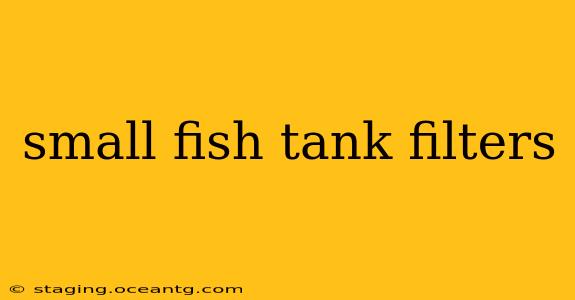Choosing the right filter for your small fish tank is crucial for maintaining a healthy aquatic environment. A well-functioning filter keeps your water clean, clear, and safe for your finned friends. This guide explores the various types of small fish tank filters, helping you select the best option for your specific needs and budget. We’ll also address common questions and concerns, ensuring you’re well-equipped to make an informed decision.
What are the Different Types of Small Fish Tank Filters?
Several filter types cater to small fish tanks, each with its advantages and disadvantages:
-
Sponge Filters: These are simple, low-maintenance filters ideal for nano tanks and beginners. They're typically powered by an air pump, creating a gentle water flow. Beneficial bacteria colonize the sponge, providing biological filtration. They are quiet, energy-efficient, and inexpensive. However, they don't offer the same level of mechanical filtration as other types.
-
Internal Filters: These are compact and submersible, fitting directly inside the tank. They're widely available in various sizes and offer a balance of mechanical, biological, and chemical filtration. Many include adjustable flow rates, allowing you to customize the water movement to suit your fish's needs. They are relatively easy to clean and maintain.
-
Hang-on-back (HOB) Filters: While often associated with larger tanks, smaller versions of HOB filters are suitable for some small tanks. These filters hang on the back of the aquarium, offering good filtration capacity in a compact footprint. They provide excellent mechanical and biological filtration. However, they require more space than internal filters and can be slightly noisy depending on the model.
What Size Filter Do I Need for My Small Fish Tank?
The ideal filter size depends on the tank's capacity (gallons) and the bioload (number and type of fish). A general rule is to choose a filter rated for at least twice the tank's volume. For instance, a 5-gallon tank would benefit from a filter rated for 10 gallons or more. Over-filtration is generally preferable to under-filtration, as it ensures efficient waste removal and water clarity. Always consider the specific needs of your fish; some species are more sensitive to strong water currents than others.
How Often Should I Clean My Small Fish Tank Filter?
Cleaning frequency depends on the filter type and the tank's bioload. Sponge filters often require less frequent cleaning, perhaps once a month, simply rinsing them gently in old tank water. Internal and HOB filters usually need more attention, with media requiring cleaning or replacement every 2-4 weeks. Never clean all the filter media at once, as this can disrupt the beneficial bacteria colony, leading to an ammonia spike and harming your fish. Always rinse the filter media in old aquarium water, avoiding tap water which contains chlorine and other chemicals harmful to beneficial bacteria.
What are the Best Small Fish Tank Filters? (This section would require subjective opinions and potentially change frequently so a specific brand name would not be included.)
There's no single "best" filter, as the ideal choice depends on your individual needs and preferences. Consider factors such as tank size, bioload, budget, and desired level of maintenance when making your selection. Research different brands and models to find one that aligns with your priorities. Read reviews from other aquarium hobbyists to gain valuable insights before making a purchase.
Can I Use a Larger Filter Than Recommended for My Small Tank?
Yes, using a slightly larger filter than recommended is generally acceptable and often beneficial. Over-filtration can enhance water quality, providing a more stable and healthier environment for your fish. However, ensure the filter's flow rate isn't excessively strong, as this could stress your fish.
Are there any DIY Small Fish Tank Filter Options?
While commercially available filters are convenient, some hobbyists create DIY filters using readily available materials. These options can be cost-effective but might require more maintenance and may not provide the same level of filtration efficiency as store-bought models. Research thoroughly before attempting a DIY filter to ensure you create a safe and effective system.
This comprehensive guide provides a solid foundation for choosing the best small fish tank filter. Remember, providing a clean and healthy environment is key to your fish's well-being. Happy filtering!
